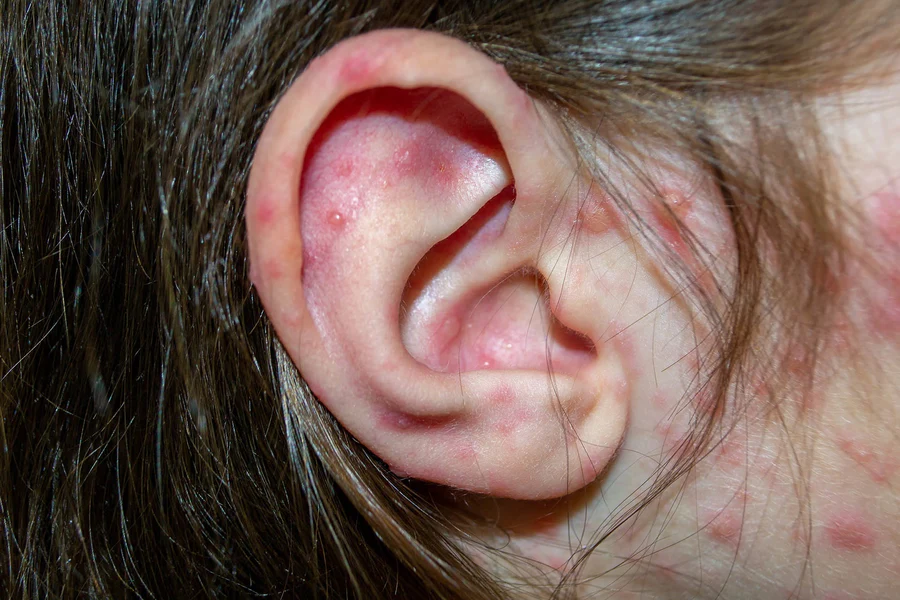Ear canal dermatitis is a common skin condition that can cause significant discomfort. Many people experience itching, redness, and irritation in their ear canals without knowing why. This condition affects the delicate skin inside your ears and needs proper care to heal. Understanding how to manage this problem can help you find relief and prevent it from coming back.
What Is Ear Canal Dermatitis?
This skin condition happens when the sensitive skin inside your ear canal becomes inflamed. The ear canal is the tube that connects your outer ear to your eardrum. When this area gets irritated, it can cause many uncomfortable symptoms. The skin in your ear canal is thin and sensitive, which makes it easy to irritate.
Different things can trigger this condition. Sometimes it happens because of allergies. Other times it occurs from using products that irritate your skin. Even simple actions like cleaning your ears too much can cause problems. The good news is that you can manage ear canal dermatitis with the right approach.
Common Causes of Ear Problems
Several factors can lead to irritation in your ear canal. Knowing what causes these issues helps you avoid them. Some people develop problems from using cotton swabs too often. These swabs can push wax deeper into your ear and scratch the delicate skin inside.
Allergic reactions also play a big role. Hair products, earrings, or even hearing aids can trigger skin reactions. Water trapped in your ears after swimming or showering creates a moist environment where problems can develop. Some people have sensitive skin that reacts to many different things.
Skin conditions like eczema can also affect your ears. When you have ear eczema, the skin becomes dry, itchy, and inflamed. This makes your ears feel uncomfortable and sometimes painful.
Recognizing the Symptoms
The signs of ear canal dermatitis are usually easy to notice. Most people first experience itching inside their ears. This itching can be mild or very intense. You might feel the urge to scratch or stick something in your ear to find relief.
Redness and swelling often develop next. The skin inside your ear may look pink or red. Some people notice flaky or scaly skin around their ears. Clear or yellowish fluid might drain from your ear. Your ear may feel full or blocked, and sounds might seem muffled.
Pain is another common symptom. The discomfort can range from mild to severe. Some people feel burning or stinging sensations. If you notice these signs, addressing them early helps prevent worse problems.
Simple Home Care Tips
Taking care of your ears at home is important for managing this condition. Start by keeping your ears dry. After washing your hair or swimming, gently dry your ears with a soft towel. Tilt your head to each side to help water drain out naturally.
Stop using cotton swabs inside your ears. These tools can damage sensitive skin and push problems deeper. Your ears clean themselves naturally, so you do not need to dig inside them. If you must clean your ears, wipe only the outer part with a damp cloth.
Avoid putting any products in your ears unless your doctor recommends them. Hair sprays, gels, and other styling products should not go into your ear canal. Be careful when applying these products to keep them away from your ears.
Treatment Options That Work
Several treatment methods can help soothe irritated ear canals. Many cases of ear eczema respond well to gentle care and proper treatment. Your doctor might suggest special ear drops that reduce inflammation and itching.
Moisturizing the skin around your ears helps prevent dryness. Use fragrance-free lotions or creams on the outer ear only. Never put regular lotions inside your ear canal. Some doctors prescribe medicated creams specifically designed for ear problems.
For severe cases, stronger medications might be necessary. Steroid creams or drops can reduce swelling and calm irritated skin. Antibiotic treatments help if an infection develops. Always follow your doctor’s instructions when using these medicines.
Preventing Future Flare-Ups
Prevention is key to managing ear canal problems long-term. Identify what triggers your symptoms and avoid those things. If certain earrings bother you, switch to hypoallergenic materials like surgical steel or titanium.
Protect your ears from excess moisture. Wear earplugs when swimming if water bothers your ears. Some people benefit from using a hair dryer on the lowest setting to gently dry their ear canals after getting wet. Hold the dryer at least a foot away from your ear.
Keep your immune system strong through healthy habits. Eat nutritious foods, get enough sleep, and manage stress. These simple steps help your body fight inflammation and heal better.
When to See a Doctor
Some situations require professional medical help. If your symptoms last more than a few days despite home care, make an appointment with your doctor. Severe pain, hearing loss, or discharge with a bad smell needs immediate attention.
Signs of infection include increased swelling, warmth, and fever. If you notice these symptoms, seek medical care right away. Your doctor can examine your ears properly and recommend the best treatment plan.
People with ongoing skin conditions should work closely with healthcare providers. Managing ear eczema often requires a combination of treatments and lifestyle changes. Regular check-ups help ensure your condition stays under control.
Living Comfortably with Ear Problems
Managing ear canal dermatitis takes patience and consistent care. Most people find relief by making simple changes to their daily routines. Pay attention to what bothers your ears and avoid those triggers. Use gentle products and keep your ears clean and dry.
Remember that healing takes time. Your ear canals need several weeks to fully recover after irritation. Be patient with the process and stick to your treatment plan. Many people successfully manage their symptoms and enjoy comfortable, healthy ears.
Taking care of ear eczema and related conditions becomes easier once you understand the basics. With proper care and attention, you can reduce discomfort and prevent future problems. Your ears deserve gentle treatment and regular care to stay healthy and comfortable for years to come.


